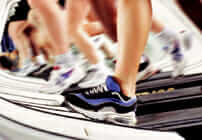Running injury free requires near perfect technique, great shoes, possibly the addition of orthotics/insoles, and a gradual build-up after long periods of no running or beginning a running plan.
To avoid or deal with running injuries, remember this saying. “If it hurts to run, stop running. If it hurts to walk, do not run. If it hurts doing nothing/walking, go to a doctor.”
Below is a Beginner Running Chart for people seeking to start an exercise plan and need to lose 20+ lbs: (always start your run workout with a quick 5:00 walk and light leg stretch). The RUN / WALK method is highly recommended as you are learning to run.
Each Run Workout is to be done THREE times a week
|
Week 1 |
Walk 20-30 minutes / stretching entire body daily (monitor weight loss*) |
|
Week 2 |
Run 1:00 / Walk 1-2:00 for 20-30 minutes |
|
Week 3 |
Run 1:00 / Walk 1:00 for 30 minutes (listen body as injuries occur this week**) |
|
Week 4 |
3 Sets of Run 1:30 / Walk 1:30 | 3 Sets of Run 2:00 / Walk 1:00 |
|
Week 5 |
3 Sets of Run 2:30 / Walk 1:00 | 3 Sets of Run 2:00 / Walk 30 seconds |
|
Week 6 |
4 Sets of Run 3:00 / Walk 1:30 |
|
Week 7 |
Run 1 mile / try non-stop / walk 1 mile fast |
|
Week 8 |
Run / walk combo 2.5 miles (from weeks 8-10 – try to run as much as you can) |
|
Week 9 |
Run / walk combo 2.75 miles |
|
Week10 |
Run / walk combo 3 miles |
-
* – if you are losing 2-3 lbs this week by simply adding walking / stretching and more water to your life – keep it up until weight loss slows to under 1 lb per week.
-
** – Typically injuries occur during running programs the 3rd week IF too aggressive with initial training
Running When Overweight – The human body is built for survival and is quite resilient to most of the stresses we can throw at it; however, the knee is not designed to take too much excess weight even through a pain free running program. Usually meniscus and articular cartilage will wear away exposing bone on bone and premature arthritis. This takes years though. So, if you are over 40 lbs overweight replace walking/running everyday with some days of non-impact aerobics like biking, swimming, rowing or elliptical gliding.
Read more about proper running techniques to prevent injuries and get the most out of your running workout.
STUART FISCHER, M.D., a graduate of Yale University, completed his residency at Maimonides Hospital in Brooklyn, and served as an Attending Physician at Cabrini Medical Center in New York City. He also worked with the late Dr. Robert Atkins as the Associate Medical Director of the Atkins Center. His expertise in alternative medicine, nutrition, and weight loss, is complemented by his strong traditional, hospital-based education. He is the author of The Little Book of Big Medical Emergencies and The Park Avenue Diet.





